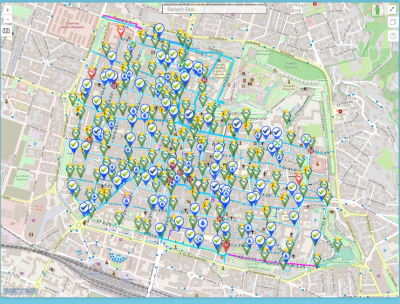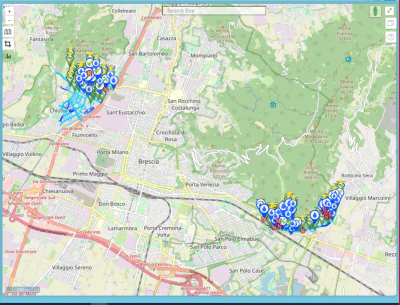
Case Study in Brescia, Italy: Estimated savings of 1.4 million cubic meters of water and €560,000; Estimated reduction of 504,000 kg GHG emissions

The Benchmark
To evaluate the technical efficacy and value proposition of the AQS system a benchmark must be developed. Fixed base CCAM systems are permanently installed and collect data continuously. The more pipe length that is covered and the longer the sensors are installed all have a bearing on how well the systems functions. It is not adequate to only count the number of leaks found. This does not consider how long they have been active.
CCAM systems detect existing leaks typically as soon as they are installed. The benefit is accrued over time as newly formed leaks are detected and repaired. It is also critical to know how many km of pipe the systems are monitoring. The more pipeline the sensors are monitoring the more leaks will be found. Therefore, a performance metric that takes into account the number of sensors, time deployed and length of pipe cover must be developed to evaluate the value of the system and to be able to compare it to other systems and other projects. The performance metric used herein is leaks detected per 100km per year; leaks/100km/year. For smaller installations this can be reduced to leaks per km per year.
Performance and Results
In the Brescia project the city center sensors have been installed and active for a 36-month continuous period. In the suburban areas they have been active for 18 months. This equates to a performance metric in the city center of 93 leaks per 100km per year and in the suburban area of 75 leaks per 100km per year.
| AQS LEAK DETECTION PERFROMANCE | ||||
| Leaks | KM | Time | L/100KM/Year | |
| City Center | 134 | 48 | 36 months | 93 |
| Suburban | 36 | 31 | 18 months | 75 |
This is an exceptional performance as the system appears to be able to detect all the leaks occurring in the areas covered by the sensors. It has been reported that in Italy, when once year traditional leak detection programs are implemented, one leak per 1.5 km are found. This equates to a performance metric of 67 leaks per 100km per year. The results obtained in this project are 10 – 50 % higher than this. The AQS system can detect small leaks from inception through the time they are large enough for the utility to deploy a crew to pinpoint the leak and repair it. The AQS system can detect very small leaks and track their progression through its algorithm and dashboard.
The 170 leaks that have been found by the AQS system over the time period analyzed have a number of positive value propositions. The average leak size in this study is estimated to be 16l/minute and it is assumed that each leak would last for 12 months if no pro-active leak detection program was in place. The estimated leak life would be one year as well if a utility performed traditional leak detection programs that inspected the same pipe section once a year. This equates to a total estimated volume of water saved of 1.4 million cubic meters per year. At a cost of water production of 0.4 EUR per cubic meter, A2A estimated saving is 560,000 EUR. A total of 360 g of GHG is generated per cubic meter of water delivered. The repaired leaks reduce the GHG emissions by 504,000 kg per year and the amount of energy used by 1 million KWh per year.

Conclusions
Tullio Montagnoli, CEO A2A Ciclo Idrico: “To reduce water loss, in my opinion, it is essential to be able to identify leaks early on. In Brescia historical city center we have installed a number of 180 sensors to cover 50km of water supply network. A few years ago, we had water losses of 32%, which is under the national average of water loss rates. Now we have reached 28% “
Koen Verweyen, CEO Aquarius Spectrum: “In the heart of Brescia, we’ve not only showcased our technology’s capability but also the synergy of our collaboration with A2A Ciclo Idrico and Pipecare. This project is more than numbers; it’s a testament to the paradigm shift we’re bringing to sustainable water management. At AQS, our mission is to massively reduce the non-revenue-water in existing and future water infrastructures, while protecting the history it flows through. From the UNESCO heritage of Brescia to the sacred streets of Jerusalem, we’re committed to preserving both.”
Nicola Ruggiero, CEO Pipecare: “As partner of Aquarius Spectrum in Italy and long-term trusted service supplier of A2A Ciclo Idrico, we are happy to bring tangible value and innovation in the water industry in Italy. Pipecare is completing the cutting-edge technology of Aquarius Spectrum with its engineering skills, fleet management support, and continuous data analysis. Aquarius Spectrum fits exactly our mission to innovate the water sector and our vision to reduce water losses.”
This initiative showcases AQS’s unique proposition as a provider of high-performance water loss management solutions enriched by a Human-as-a-Service offering. By coupling sophisticated technology with tailored service, AQS is setting a new industry benchmark for cost-effective, sustainable water management.